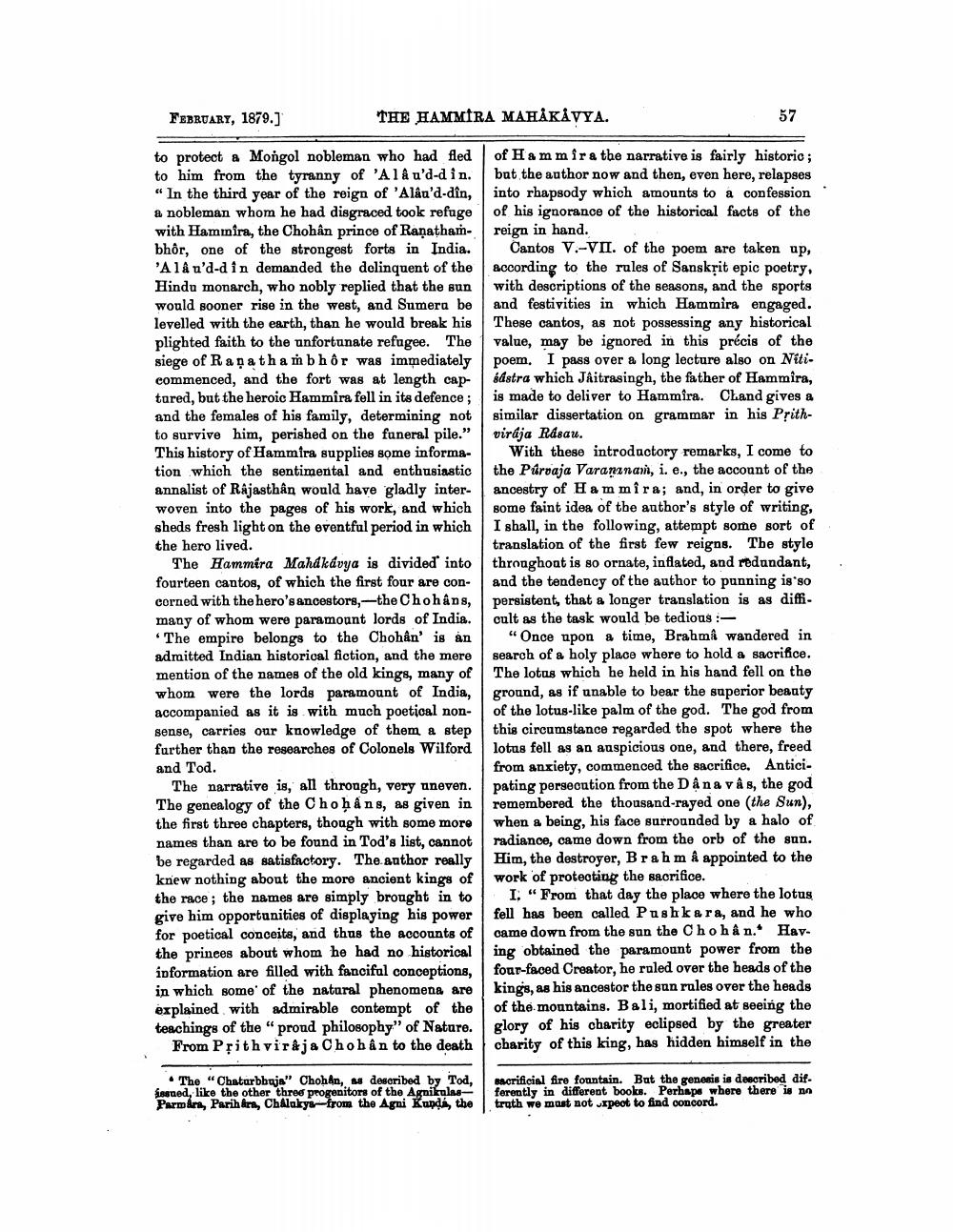________________
FEBRUARY, 1879.]
THE HAMMIRA MAHÅKÅVYA.
57
to protect a Mongol nobleman who had fled of Hammira the narrative is fairly historic; to him from the tyranny of 'Al & u'd-din. but the author now and then, even here, relapses " In the third year of the reign of 'Alau'd-dîn, into rhapsody which amounts to a confession a nobleman whom he had disgraced took refuge of his ignorance of the historical facts of the with Hammira, the Chohận prince of Ranatham- reign in hand. bhôr, one of the strongest forts in India. Cantos V.-VII. of the poem are taken up, 'Alå u'd-d in demanded the delinquent of the according to the rules of Sanskrit epic poetry, Hindu monarch, who nobly replied that the sun | with descriptions of the seasons, and the sports would sooner rise in the west, and Sumera be and festivities in which Hammira engaged. levelled with the earth, than he would break his These cantos, as not possessing any historical plighted faith to the unfortunate refugee. The value, may be ignored in this précis of the siege of Ranatha bhôr was immediately poem. I pass over a long lecture also on Niti. commenced, and the fort was at length cap- sástra which Jaitrasingh, the father of Hammira, tured, but the heroic Hammîra fell in its defence; is made to deliver to Hammira. Chand gives a and the females of his family, determining not similar dissertation on grammar in his Prithto survive him, perished on the funeral pile.” | viraja Råsau. This history of Hammira supplies some informa- With these introductory remarks, I come to tion which the sentimental and enthusiastic the Púrvaja Varanınan, i. e., the account of the annalist of Rajasthân would have gladly inter- ancestry of Hammira; and, in order to give woven into the pages of his work, and which some faint idea of the author's style of writing, sheds fresh light on the eventful period in which I shall, in the following, attempt some sort of the hero lived.
translation of the first few reigns. The style The Hammira Mahakávya is divided into throughoat is so ornate, inflated, and redundant, fourteen canton, of which the first four are con- and the tendency of the author to punning is so corned with the hero's ancestors,-the Chohans, persistent, that a longer translation is as diffimany of whom were paramount lords of India. cult as the task would be tedious :
The empire belongs to the Chohân' is án "Once upon a time, Brahma wandered in admitted Indian historical fiction, and the mere search of a holy place where to hold a sacrifice. mention of the names of the old kings, many of The lotus which he held in his hand fell on the whom were the lords paramount of India, ground, as if unable to bear the superior beauty accompanied as it is with much poetical non- of the lotus-like palm of the god. The god from sense, carries our knowledge of them a step this circumstance regarded the spot where the farther than the researches of Colonels Wilford lotus fell as an auspicious one, and there, freed and Tod.
from anxiety, commenced the sacrifice. AnticiThe narrative is, all through, very uneven. pating persecution from the Dâna vâs, the god The genealogy of the Chohans, as given in remembered the thousand-rayed one (the Sun), the first three chapters, though with some more when a being, his face surrounded by a halo of names than are to be found in Tod's list, cannot radiance, came down from the orb of the sun. be regarded as satisfactory. The author really Him, the destroyer, Brahm & appointed to the knew nothing about the more ancient kings of work of protecting the sacrifice. the race; the names are simply brought in to I. "From that day the place where the lotus give him opportunities of displaying his power fell has been called Pushkara, and he who for poetical conceits, and thus the accounts of came down from the sun the Chohan.. Havthe princes about whom he had no historical ing obtained the paramount power from the information are filled with fanciful conceptions, four-faced Creator, he ruled over the heads of the in which some of the natural phenomena are kings, as his ancestor the sun rules over the heads explained with admirable contempt of the of the mountains. Bali, mortified at seeing the teachings of the "prond philosophy" of Nature. glory of his charity eclipsed by the greater
From Prithvirkja Choban to the death charity of this king, has hidden himself in the
• The "Chaturbbajs" Chohan, as described by Tod, insged, like the other three progenitors of the AgnikulasParmars, Parih fra, ChAlakys -- from the Agni Kunds, the
Macrificial fire fountain. But the generis is described differently in different books. Perhaps where there is no truth we must not uspeot to find concord.




